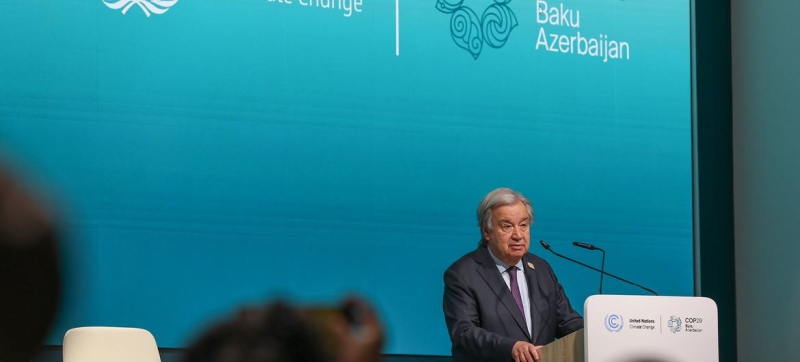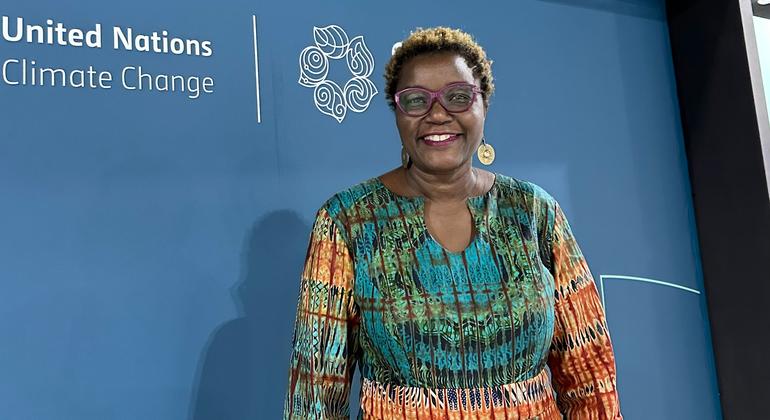
UN Secretary-General Antonio Guterres at COP29 in Baku, Azerbaijan UN Secretary-General to COP29 in Baku: Failure in talks unacceptable Climate and Environment
Speaking at the UN Climate Change Conference in Baku, which is set to formally end on Friday, UN Secretary-General Antonio Guterres called on world leaders and negotiators to overcome their differences and reach a landmark agreement on climate finance. “I feel there is a will to reach an agreement,” he said, stressing that “failure is unacceptable.”
Guterres returned to Baku after attending the G20 summit in Rio de Janeiro. Speaking in the capital of Azerbaijan on Thursday afternoon, he voiced the main message of his address to the G20 leaders: the time for talk is over, important decisions must be taken without delay. “Failure is not an option,” the UN Secretary-General said, warning that inaction could have catastrophic consequences for the planet.
“The clock is ticking at COP29”
In his speech, Guterres stressed that every minute counts. “The clock is ticking. COP29 is drawing to a close,” he said. Despite significant progress, sharp disagreements remain on key issues.
The UN Secretary-General warned that failure at this summit would jeopardize not only short-term action, but also preparations for the next climate summit, COP30, in Brazil. According to him, humanity risks losing the time needed to prevent climate tipping points.
The Way Forward
Guterres laid out a clear plan of action: climate finance must play a key role. The new financing target must include large-scale injections into the economies of developing countries that will allow them to adapt to climate change and reduce greenhouse gas emissions.
Soften Hardline Positions, Find Common Ground
The UN Secretary-General paid special attention to the need to finance the transition to clean energy and protect the most vulnerable countries from the effects of climate disasters. “Without trust and solidarity, we will not be able to meet this challenge. International cooperation, with the Paris Agreement at its core, is indispensable for climate action,” he stressed.
“Investment, not charity”
Guterres dispelled the idea of climate finance as charity. He called it a “down payment” on a more sustainable future. “Multilateral development banks have already committed to providing $120 billion a year by 2030. Another $65 billion should come from the private sector,” he recalled. In addition, the “Pact for the Future,” adopted in September, includes commitments to expand the lending capacity of development banks and ease access to finance.
A Call for Unity Amid Division
Recognizing the depth of geopolitical differences, Guterres appealed to leaders for unity. “Soften tough positions, find common ground,” he said, stressing that failure would be a loser for all. “We must act. Time is running out, and the rewards are worth the effort,” Guterres concluded.
“Women’s Day” at COP-29
Women’s rights in the context of combating climate change were discussed at the UN Climate Conference in Baku on November 21. Climate and gender issues are intertwined: the climate crisis is exacerbating existing inequalities.

Women, especially in poor and vulnerable communities, often bear the brunt of climate-related disasters due to their roles as caregivers and food providers. Limited access to resources, education and decision-making further increases their vulnerability. For example, during droughts or extreme weather conditions, women are often forced to collect water, food and fuel for their families, exposing themselves to serious risks.
Women and girls in sub-Saharan Africa spend 200 million hours every day just fetching water
“Women and girls in sub-Saharan Africa spend 200 million hours every day just fetching water,” Jemima Njuki, chief of economic empowerment at UN Women, told UN News. “To put that into perspective, that’s the equivalent of the entire working population of the UK working in one day.”
Climate change also increases women’s food and economic vulnerability, Njuki said. “Our research shows that under the worst-case scenario of the climate crisis, an additional 236 million women and girls will face food insecurity and 158 million will fall into poverty,” she said. The climate crisis also increases the amount of unpaid work that women and girls do.
The Volume and Quality of Financing
“Despite progress in areas such as girls’ education and reducing maternal and child mortality, we are facing growing resistance to women’s rights,” Njuki added. She noted that the outcome of COP29 is critical to advancing gender equality. “We are concerned not only about the volume of financing, but also about its quality. We need to make climate finance more gender-responsive so that feminist movements, indigenous peoples and women working on climate issues have access to these funds,” she said.
Land Rights
UN News Service also spoke with Jessica Hernandez, an indigenous scholar and activist who works for Landesa, advocating for indigenous land rights. Hernandez emphasized the need to include land rights in nationally determined contributions. “2.5 billion people in rural and indigenous communities already protect ecosystems that are vital to human survival, but only a minority have legally protected rights to that land,” she said.
Jessica Hernandez, named one of the 100 most powerful women in Central America by Forbes, also noted the key role indigenous women play in sustainable resource management and food security. However, she continued, because many of them do not have land rights, they are at risk of losing their land at any time, which hinders long-term planning.
Carolina Santos, a representative of the Brazilian youth organization Engajamundo, called for the participation of women and girls in discussions related to land rights and access to climate finance.
By dedicating a special day to discuss the gender dimensions of climate change, COP29 organizers drew global attention to the relationship between climate change and gender equality, as well as the need for change to protect vulnerable groups.
